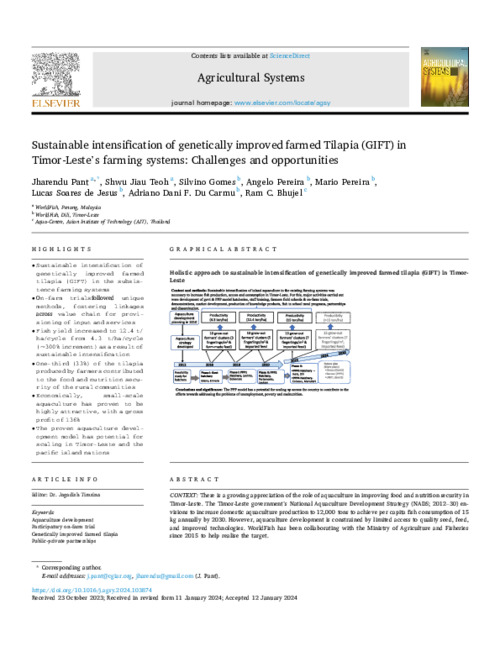Please use this identifier to cite or link to this item:
https://hdl.handle.net/20.500.12348/5867
Sustainable intensification of genetically improved farmed Tilapia (GIFT) in Timor-Leste's farming systems: Challenges and opportunities
| dc.creator | Pant, J. | en_US |
| dc.creator | Teoh, S. | en_US |
| dc.creator | Gomes, S. | en_US |
| dc.creator | Pereira, A. | en_US |
| dc.creator | Pereira, M. | en_US |
| dc.creator | De Jesus, L. | en_US |
| dc.creator | Du Carmu, A.D. | en_US |
| dc.creator | Bhujel, R. | en_US |
| dc.date.accessioned | 2024-03-19T18:33:56Z | |
| dc.date.available | 2024-03-19T18:33:56Z | |
| dc.date.issued | 2024 | en_US |
| dc.identifier.citation | Jharendu Pant, Shwu Jiau Teoh, Silvino Gomes, Angelo Pereira, Mario Pereira, Lucas Soares De Jesus, Adriano Du Carmu, Ram C Bhujel. (23/2/2024). Sustainable intensification of genetically improved farmed Tilapia (GIFT) in Timor-Leste's farming systems: Challenges and opportunities. Agricultural Systems, 216. | en_US |
| dc.identifier.issn | 0308-521X | en_US |
| dc.identifier.uri | https://hdl.handle.net/20.500.12348/5867 | |
| dc.description.abstract | CONTEXT: There is a growing appreciation of the role of aquaculture in improving food and nutrition security in Timor-Leste. The Timor-Leste government's National Aquaculture Development Strategy (NADS; 2012–30) envisions to increase domestic aquaculture production to 12,000 tons to achieve per capita fish consumption of 15 kg annually by 2030. However, aquaculture development is constrained by limited access to quality seed, feed, and improved technologies. WorldFish has been collaborating with the Ministry of Agriculture and Fisheries since 2015 to help realise the target. OBJECTIVE: The objective was to present step-wise interventions – Genetically Improved Farmed Tilapia (GIFT) hatcheries establishment and monosex seed production and distribution; conduct of on-farm grow-out trials; training and capacity building; and extension, communication and marketing services - carried out, and demonstrate how availability, accessibility and consumption of fish could be increased sustainably in the subsistence farming systems of Timor-Leste. METHODS: Farmers' participatory grow-out trials following better management practices (BMPs) were conducted in two phases from 2015 to 2023 across ten farmers clusters in four municipalities in inlands. The trials in Phase 1 tested GIFT stocked at 3 fingerlings/m2 using green water in ponds and fed with locally made plant-based feed. In Phase 2, trials tested GIFT stocked at 5 fingerings/m2 with high quality imported pelleted feed supplemented with local feed and green water. To facilitate scaling, local service providers, feed importers and fish market operators were trained to facilitate input supply and output marketing. RESULTS AND CONCLUSIONS: In Phase-1, one existing public hatchery was upgraded for producing and supplying quality GIFT broodstock to private hatcheries and one private hatchery was established with public-private partnership (PPP) model. On-farm trials showed that farmers following BMPs and feeding with farm made feed achieved fish yield averaging 4.3 ± 1.5 t/ha/11 months production cycle. In Phase-2, PPP model hatcheries were established; nursery operators connected to each hatchery started nursing fry to fingerlings to local farmers. On-farm trials results managed by 169 farmers in 417 ponds during 2020–2022 showed fish yield of 12.4 ± 0.1 t/ha/ 6 month cycle with full BMPs, suggesting the viability of GIFT intensification across Timor-Leste. Continuous technical backstopping of public and private sectors, however, is crucial for scaling and sustainable intensification of aquaculture. SIGNIFICANCE: GIFT aquaculture development model of Timor-Leste has potential for scaling across the country for reducing peoples' malnutrition and poverty. The model can also potentially be replicated to other small island nations of the Asia-Pacific region and beyond. | en_US |
| dc.format | en_US | |
| dc.language | en | en_US |
| dc.publisher | Elsevier Masson | en_US |
| dc.rights | CC-BY-NC-ND-4.0 | en_US |
| dc.source | Agricultural Systems;216,(2024) | en_US |
| dc.subject | food and nutrition security | en_US |
| dc.subject | genetically improved farmed tilapia | en_US |
| dc.subject | participatory on-farm trial | en_US |
| dc.title | Sustainable intensification of genetically improved farmed Tilapia (GIFT) in Timor-Leste's farming systems: Challenges and opportunities | en_US |
| dc.type | Journal Article | en_US |
| cg.contributor.funder | United States Agency for International Development | en_US |
| cg.contributor.funder | Ministry of Foreign Affairs and Trade (New Zealand) | en_US |
| cg.contributor.project | Partnership for Aquaculture Development in Timor-Leste (PADTL) Phase 2 | en_US |
| cg.coverage.country | Timor-Leste | en_US |
| cg.coverage.region | South-Eastern Asia | en_US |
| cg.subject.agrovoc | public-private partnerships | en_US |
| cg.subject.agrovoc | timor-leste | en_US |
| cg.subject.agrovoc | aquaculture development | en_US |
| cg.subject.agrovoc | fish | en_US |
| cg.contributor.affiliation | WorldFish | en_US |
| cg.contributor.affiliation | Asian Institute of Technology | en_US |
| cg.contributor.affiliation | Timor Leste Ministry of Agriculture and Fisheries | en_US |
| cg.identifier.status | Open access | en_US |
| cg.identifier.ISIindexed | ISI indexed | en_US |
| cg.contribution.worldfishauthor | Pant, J. | en_US |
| cg.contribution.worldfishauthor | Teoh, S. | en_US |
| cg.contribution.worldfishauthor | Gomes, S. | en_US |
| cg.contribution.worldfishauthor | Pereira, A. | en_US |
| cg.contribution.worldfishauthor | Pereira, M. | en_US |
| cg.contribution.worldfishauthor | De Jesus, L. | en_US |
| cg.contribution.worldfishauthor | Du Carmu, A.D. | en_US |
| cg.description.theme | Sustainable aquaculture | en_US |
| dc.identifier.doi | https://dx.doi.org/10.1016/j.agsy.2024.103874 | en_US |
| cg.creator.id | Shwu Jiau Teoh: 0000-0001-7676-8583 | en_US |
| cg.subject.actionArea | Resilient Agrifood Systems | en_US |
| cg.contributor.initiative | Aquatic Foods | en_US |
Files in this item
This item appears in the following Collection(s)
-
Sustainable aquaculture [2735]
